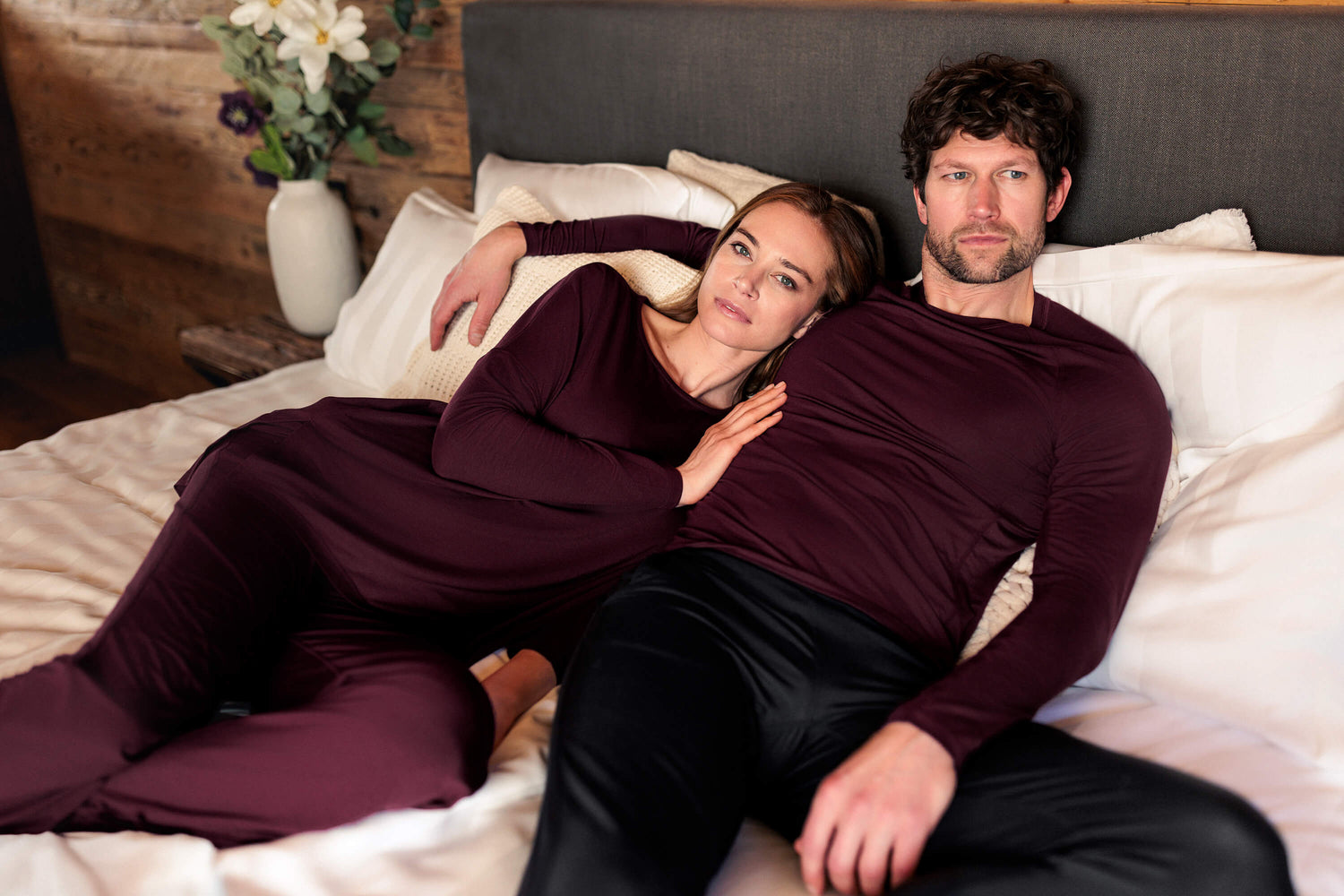Top tips for a better sleep
Sweating while sleeping
Sweating while sleeping? Then you are one in three that sweats at night. Night sweats are usually totally normal, but there are actions we can take to sweat less and to sleep better. Read more about the most common reasons for night sweats and what you can do to combat them.
What is the cause of night sweats? | How much sweating at night is normal? | Excessive sweating at night | What can I do to combat night sweats? | How do I find the best pajamas for night sweats?
The cause
What is the cause of night sweats?
There are many factors that can cause us to sweat at night. Below some of the most common ones are listed:
HEALTH
Our physical condition probably has the greatest influence on the quality of sleep. Health problems such as stress, medications, but also hormonal changes can affect how well we sleep and sweat at night. If you believe that your night sweats are linked to a medical issue you should always consult your doctor.
STRESS
Feeling stressed from time to time is absolutely normal. However, if stress becomes chronic, it can have a lasting effect on the quality of our sleep. Not only can stress disrupt our sleep, but too little sleep in turn promotes the feeling of stress: a so-called stress-sleep cycle develops that is hard to break. Elevated levels of stress has also been linked to night sweats.
MENOPAUSE
Hormonal changes during menopause cause sleep disturbances for 3 in 4 women. One of the most commonly cited reasons for impaired sleep during menopause is hot flashes. Researchers believe that hot flashes and subsequent night sweats are linked to a drop in oestrogen levels. This fools the brain into thinking that the body is overheating and thus "forces" blood vessels to dilate in order to cool down, which in turn increases the blood flow to the skin and leads to flushing and finally night sweats.
PREGNANCY
Night sweats are also common during pregnancy and breastfeeding. Many women report suffering from hot flashes during this time and struggle to keep the best temperature for sleep.
MEDICATION
Certain medications can also disturb the body's natural temperature balance. Night sweats are a known side effect for drugs affecting the vegetative nervous system, such as antidepressants. However, more common medications such as paracetamol or blood sugar-lowering drugs can also cause night sweats. In those cases, it is essential you speak to your doctor about it.
DIET
Diet has a great influence on the quality of our sleep. For example, heavy, spicy or well-seasoned foods make us sweat more. The same applies to caffeine, nicotine, and alcohol.
SPORT & EXERCISE
It has been scientifically proven that athletes sweat less than people who do not exercise. It’s also been shown that regular exercise improves sleep. However, if sport is practised too close to bedtime, it can quickly become counterproductive: the metabolism is running at full speed and the body is too warmed up for sleep.
ROOM TEMPERATURE & HUMIDITY
Due to central heating and improved house insulation, our bedrooms are about 5ºC/ 40°F warmer today than they were 50 years ago. This might feel comfortable during the day, but can affect our sleep quality if we can't release excess heat. For optimal sleep, the room temperature should not exceed 18°C/ 64°F.
Humidity also has a great influence on the quality of our sleep: it should be neither too high nor too low. If it is higher than 50-55%, this can further night sweats, as the air is already saturated and moisture remains on the skin.
BED, BEDDING & SLEEPWEAR
The wrong bed, bedding and sleepwear can also cause you to sweat at night. If the materials aren't breathable, excess heat is trapped in and you start to sweat while sleeping. In particular, synthetic materials can cause night sweats and make you too hot to sleep.
The insight
How much sweating at night is normal?
We all sweat; the process is natural and helps us to release excess heat and thus regulate our body temperature. Even when we do nothing at all, we sweat - about 0.5 to 1 litre of fluids is lost every day in that manner. In general, however, this process goes unnoticed; only when our sweat glands are activated, for example during physical activity or hot weather, do we start to sweat noticeably.
Normally during one night we would sweat up to one cup which might sound a lot. If you are waking up sweating you might suffer from excessive sweating at night.
The insight
Excessive sweating at night
Only when it starts to disturb our sleep, we can talk of excessive sweating. Those affected by it wake up drenched in sweat and, in the worst case, have to change their sleepwear and bedding. That is the big problem with night sweats: whatever we wear becomes damp and clammy and cools down the body to such an extent that our core body temperature falls below the optimal value. And if we get too cold, we start trembling – usually the moment sleep is no longer possible.
Excessive sweating has the same possible causes as regular night sweats. Read our tips and advice on what you can do to reduce sweating while sleeping and if that doesn't work, or you believe you might have a medical problem, contact your doctor.
The action
What can I do to combat night sweats?
Most important of all is to find the cause for your night sweats. Is it due to the sleeping environment? Or stress? Or could there be physical changes such as pregnancy or menopause that cause the nightly hot and cold sweats? If the reason for the increased sweating is known, it can be addressed specifically.
However, there are also measures you can take to prevent night sweats, regardless of the cause:
ADJUST WHAT YOU EAT AND DRINK
Avoid hard-to-digest or spicy foods late at night - Reduce consumption of alcohol, nicotine and coffee where possible. Sage tea is a well-known home remedy for excessive sweating. It is best to prepare the tea about 1 hour before going to bed. It should infuse for about 10 minutes and then be drunk lukewarm or even cold to make sure there is no additional heat supplied.
REGULAR EXCERCISE:
Doing sports 1-2 times a week can improve sleep quality by up to 65%. Just make sure to not do any tough sports up to 2 hours before going to bed.
RELIEVE STRESS
To reduce stress related night sweats, try to reduce your stress levels at night. Stop working at least 1 hour before going to bed and start a relaxing bed time routine for example with a cup of tea or a relaxing bath. If you feel your mind is racing as you go to bed, write down your thoughts on a piece of paper and keep a note pad and pen by your bed in case you wake up at night.
ALTERNATING SHOWERS
Alternating hot and cold showers gets the circulation going and contracts the skin pores. Regular use can even reduce the production of sweat.
KEEP THE ROOM TEMPERATURE LOW
Our bed rooms should be below 18°C/ 64°F for optimal sleep. If your room tends to get warmer during the summer try keeping the blinds/ curtains as well as windows closed during the day to avoid heat build up and open to ventilate at night when the temperature has dropped. If need be use air conditioning or a fan to cool down further.
BED & BEDDING
When it comes to bedding, breathability should be your top priority. This applies not only to the duvet and bed linen, but also the mattress and possible mattress protectors. An optimal bed climate is dry; any moisture that occurs should be absorbed by the mattress and bedding and wicked away from your body. If you tend to get hot at night and sweat, you should also change the bedding more often, as the moisture-absorbing properties of the materials are exhausted more quickly. Removable mattress covers are also practical in such cases.
SWEAT WICKING PAJAMAS & NIGHTWEAR
As with bedding, breathability should be at the top of the list for pajamas & nightwear. After all, they are closest to your body and thus have the most direct influence on your quality of sleep. If the material is not breathable enough, excess body heat cannot be dissipated and the body overheats. For people who suffer from night sweats, moisture regulation obviously also plays an important role. Ideal materials are those that absorb moisture well, but also quickly wick it away from the skin. If this is not the case, the fabric can quickly feel damp & clammy - which is not only unpleasant, but will also cool down the body excessively.
Don't wake up sweating
The best pajamas for night sweats
Discover why Dagsmejan has been named the best pajamas for night sweats and how they can help you to reduce sweating while sleeping.
Dagsmejan is using botanic fibres far more breathable than cotton meaning that any heat quickly is released and you stay longer in the ideal climatic comfort zone. The temperature regulating pajamas help you to keep the best temperature for sleep night by night.
By combining the finest natural fibres with the latest textile technology, Dagsmejan sleepwear manages to pair moisture wicking with evaporative cooling. If you start to sweat, part of the sweat will remain in the core of the fibre and gradually be released into the air cooling you down through evaporative cooling. Through moisture wicking the fabric will however never feel damp.
The result? You can enjoy a deeper and longer sleep.
Why experts recommend Dagsmejan
-
"My PhD investigated links between thermoregulation, sleep and insomnia, and I saw straight away that Dagsmejan sleepwear could balance one's environment with one's body. And I never expected their sleepwear to be so damn comfortable! Sometimes when I'm working from home - I just keep wearing them. You should too."
— Professor Michael Gradisar, Sleep Researcher, Clinical Sleep Psychologist, CEO of WINK Sleep Online.
-
“Optimal sleep is essential for you, for athletes, for everyone to recover from the mental and physical demands of daily life. Yet many of us aren’t getting enough of it and, we often tend to compromise the quality. If you aim to create the best foundation and ensure your balance and ability to perform, stay healthy and happy, you need to support your body in the right way. Dagsmejan is a valid and excellent supporting tool to do exactly that.”
— Anna West, BScN/Founder of Sleep2perform, a high-performance consultancy specialized in sleep and recovery working with leading sports teams and businesses across Europe.
-
"Thermoregulation is key for a good night's sleep. To fall asleep and to enjoy a deep, restorative sleep we need for our core body temperature to drop, but if we get too cold we will shiver and our sleep quality suffers.That is why I recommend sleepwear by Dagsmejan; they help us to cool down or warm up depending on our needs so that we can sleep deeper for longer."
— Lutz Graumann, Phd & specialist in sports medicine, nutrition and chirotherapy, Member of the Dagsmejan Scientific Advisory Board
-
“Sleep, temperature and comfort are functionally linked. For a good sleep you need feel comfortably warm, not cold, nor hot. That is the oversimplified outcome of years of research during my years at the Dutch Institute of Neurosciences. Dagsmejan Sleepwear implements two basic principles for a good night of sleep in one product: It helps you maintain the right temperature and the fabric feels so comfortable that it is a true reward to wear.”
— PhD Roy Raymann, Founder of SleepCzar & Chief Scientific Officer at SleepScore Labs, Sleep Neuroscientist and Ambulatory (Sleep) Technology expert









